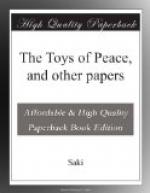“I don’t see why you should suppose that any one wants to read Baptiste Lepoy in English,” the Reverend Wilfrid remarked to his wife one morning, finding her surrounded with her usual elegant litter of dictionaries, fountain pens, and scribbling paper; “hardly any one bothers to read him now in France.”
“My dear,” said Beryl, with an intonation of gentle weariness, “haven’t two or three leading London publishers told me they wondered no one had ever translated L’Abreuvoir interdit, and begged me—”
“Publishers always clamour for the books that no one has ever written, and turn a cold shoulder on them as soon as they’re written. If St. Paul were living now they would pester him to write an Epistle to the Esquimaux, but no London publisher would dream of reading his Epistle to the Ephesians.”
“Is there any asparagus in the garden?” asked Beryl; “because I’ve told cook—”
“Not anywhere in the garden,” snapped the Rector, “but there’s no doubt plenty in the asparagus-bed, which is the usual place for it.”
And he walked away into the region of fruit trees and vegetable beds to exchange irritation for boredom. It was there, among the gooseberry bushes and beneath the medlar trees, that the temptation to the perpetration of a great literary fraud came to him.
Some weeks later the Bi-Monthly Review gave to the world, under the guarantee of the Rev. Wilfrid Gaspilton, some fragments of Persian verse, alleged to have been unearthed and translated by a nephew who was at present campaigning somewhere in the Tigris valley. The Rev. Wilfrid possessed a host of nephews, and it was of course, quite possible that one or more of them might be in military employ in Mesopotamia, though no one could call to mind any particular nephew who could have been suspected of being a Persian scholar.
The verses were attributed to one Ghurab, a hunter, or, according to other accounts, warden of the royal fishponds, who lived, in some unspecified century, in the neighbourhood of Karmanshah. They breathed a spirit of comfortable, even-tempered satire and philosophy, disclosing a mockery that did not trouble to be bitter, a joy in life that was not passionate to the verge of being troublesome.
“A Mouse that prayed for Allah’s
aid
Blasphemed when
no such aid befell:
A Cat, who feasted on that mouse,
Thought Allah
managed vastly well.
Pray not for aid to One who made
A set of never-changing
Laws,
But in your need remember well
He gave you speed,
or guile—or claws.
Some laud a life of mild content:
Content may fall,
as well as Pride.
The Frog who hugged his lowly Ditch
Was much disgruntled
when it dried.
‘You are not on the Road to
Hell,’
You tell me with
fanatic glee:
Vain boaster, what shall that avail
If Hell is on
the road to thee?




